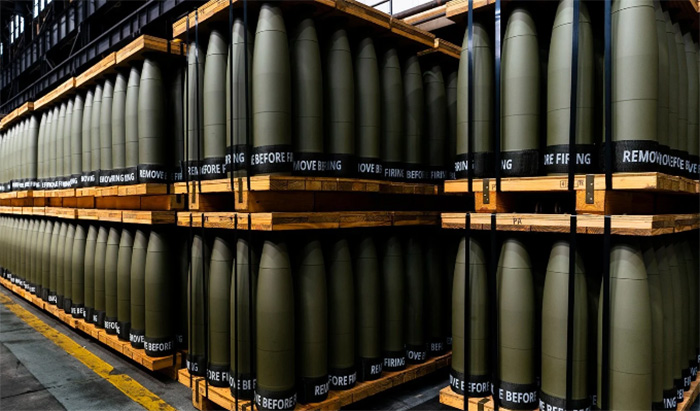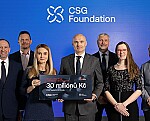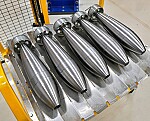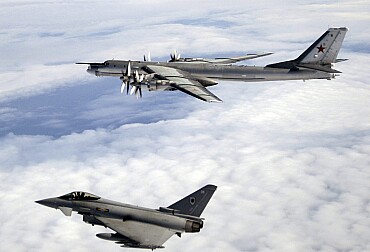Ammunition for Ukraine under the Czech Ammunition Initiative has no quality problems
Czechoslovak Group Holding (CSG) commented in a press release on the articles of the Czech media, which picked up the Financial Times article on the Czech munitions initiative (published on 30 May 2024), which is extremely important for the defence of Ukraine. However, in the course of the reproduction of the content of the said article, a false claim was made that the ammunition for Ukraine has quality problems.
In an interview by CSG owner Michal Strnad to the Financial Times, the issue was not the quality of ammunition already being supplied to Ukraine under the Czech munitions initiative, but the condition of ammunition that is yet to arrive at CSG from foreign suppliers for further processing.
Ammunition deliveries to Ukraine under the Czech Ammunition Initiative can be divided into several groups. Firstly, there is new ammunition that is completely produced in CSG companies. Secondly, new ammunition that is produced abroad by CSG partners. And thirdly, it is the purchase of stockpiles from various foreign sources.
It is in this third group, i.e. ammunition from stockpiles, that the Czech holding has to replace some of the original components with newly manufactured components from its own production to ensure full compatibility with the howitzers used by the Ukrainian armed forces. This includes, for example, the M-82 initiators that CSG produces and supplies as part of the Czech munitions initiative, as the original initiators supplied by partners are unusable for howitzers used in Ukraine.
Therefore, all ammunition supplied by CSG to Ukraine meets the quality requirements and the quality is consistently checked upon receipt.
Czech Ammunition Initiative
Under the Czech Ammunition Initiative for Ukraine, there is general talk of supplying a million or more 155 mm, 152 mm and 122 mm artillery shells. During his visit to Washington, Czech Prime Minister Fiala said that the Czech Republic has contracted 180,000 pieces of artillery ammunition and is negotiating another 300,000 pieces. The aforementioned one million pieces should then be seen as a tentatively identified total set, which President Petr Pavel spoke about, within which a real opportunity needs to be created through very hard diplomatic and coordination work and translated into a realised delivery to the Ukrainian armed forces.

This assistance is a key step, though by no means the only one, that needs to be taken if Ukraine is to be able to effectively repel the growing Russian attacks. It is clear that without sufficient ammunition, especially artillery, the Ukrainian army will be "pulling the short end of the rope" on critical sections of the front. "The situation in Ukraine is critical... They are running out of ammunition, which means they are forced to make difficult decisions on a daily basis. This makes it extremely difficult for them to hold the lines - the same lines that will decide the security and future of the whole of Europe," Prime Minister Fiala said.
The role of the Czech state, the government and the institutions subordinate to the government in this munitions initiative is decisive and irreplaceable. The Czech Republic participates not only in the financing - according to Prime Minister Fiala's announcement in the order of hundreds of millions of crowns - but mainly in the coordination with other partners, especially NATO member states, two dozen of which have already joined the initiative. The government communicates with the partner states mainly through the National Security Advisor Tomáš Pojar and the Ministry of Defence of the Czech Republic under the leadership of Jana Černochová. The Agency for Intergovernmental and Defence Cooperation (AMOS), established in 2021, operates within the structure of the Ministry.
The project, which is crucial for the successful defence of Ukraine, has had the direct support of the Prime Minister since the beginning, and the President of the Republic has also been informed about it. Although the role of the private sector and companies that have the capability and capacity to produce artillery munitions and also have well-used foreign contacts is extremely important and beneficial, without the state and the intensive work of politicians and officials, the munitions initiative in support of Ukraine would have no hope of success and would be virtually non-existent.
The initiative was born in response to Ukraine's acute need to address the shortage of artillery ammunition, which is manifested by the deteriorating situation on the front and the reduced ability of artillery to conduct effective supporting fire - a key element of defence. The Ukrainian government has therefore turned to its partners, including the Czech Republic. In fact, before the Russian attack, the Czech government, as a first step to help the threatened country, approved a proposal on 26 January 2022 allowing the transfer of unnecessary military equipment to Ukraine, namely in the form of 152 mm artillery ammunition.
In response to the Russian aggression, an informal team was formed on 24 February 2022, bringing together key representatives of the state administration and major companies of the Czech defence industry. The Czechoslovak Group (CSG) holding company plays the most prominent role in this regard, while other companies such as STV GROUP and others are also involved in the project. The outputs of the informal team from the very first moments were mainly lists of specific material, either from the state's stocks or from the defence industry's capacities, which could be provided to Ukraine.
This informal team still exists today. The Czech Republic is constantly listening to Ukraine's needs and looking for ways to provide them and to support Ukraine in line with government policy, but also in line with the approach of our NATO and EU allies. Thanks to the experience shared in this way by the public and private sectors, coordinated by the top leaders of the country's security institutions, the Czech Republic has unique information on what stocks of military equipment or artillery ammunition are potentially available around the world.
In the case of a particular ammunition initiative, this has given the Czech Republic an overview of where and how much ammunition is available in the world and has begun to create a community of states that are able and willing to finance and support the purchase of ammunition and its delivery to Ukraine. Among the first countries to contribute were the Netherlands, Denmark and Germany, but gradually the number has grown to two dozen, which in sum means a very optimistic outlook that the initiative will not come to naught.
At the same time, it cannot be expected that an economically and logistically complex and demanding operation will be carried out in one go and within a matter of weeks, however desirable and important it is for Ukraine to implement it as quickly as possible. According to Prime Minister Fialy, the first 180 000 shells will be delivered to Ukraine in the coming months. The average monthly consumption of 155 mm calibre ammunition is reported to be in the range of 90-110 thousand pieces. This is a figure from the early autumn of 2023, and today's average will undoubtedly be significantly lower. It represents the use of approximately one-sixth of the capacity of the Ukrainian artillery, which means that five-sixths cannot contribute effectively to defence due to the lack of ammunition. According to the Ukrainian Ministry of Defence, the ideal would be to be able to consume around 350 000 shells per month, which would represent a 60% capacity utilisation.
These figures alone make it abundantly clear that, however ambitious the Czech initiative's one million grenade milestone may be, and an extremely complex task, the long-term solution must be a major increase in Western artillery ammunition production capacity. And not only artillery - in addition to shells for its artillery, Ukraine also needs, for example, very urgently guided missiles for air defence systems, and of course tank ammunition, ammunition for automatic guns of armoured vehicles, anti-aircraft guns, and ammunition. The increase in production capacity should indeed be considerable, because in addition to saturating the needs of an invaded Ukraine, the NATO armies' depots, which are now woefully empty, must also be sufficiently replenished.








